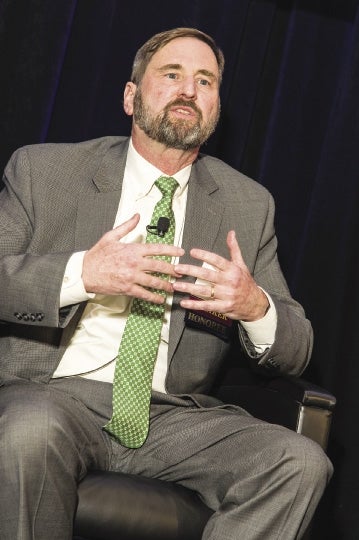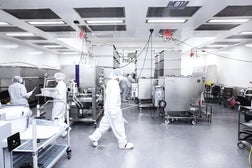FLEXcon's 60-year evolution
Spencer-based film and adhesive manufacturer FLEXcon celebrated its 60th anniversary in August, but the company's actual founding month is actually a little bit earlier in the year – or at least that's how president and CEO Neil McDonough tells it.
According to McDonough, FLEXcon was founded March 9, 1956 – the day his older brother was born. McDonough's father, Myles, walked into the delivery room and told his mother that it was finally time to start the company they had been planning.
“My father went into the hospital and saw my mother. He told her, 'I quit my job today, and I'm going to start the company,'” McDonough said. Shortly thereafter, Myles McDonough started FLEXcon in the family's garage on Maple Street in Spencer.
FLEXcon is still located in Spencer and owned by the McDonough family – but it has come a long way from its garage beginnings. The company, a world leader in pressure-sensitive adhesive products, is now headquartered in a large research-and-development facility along Route 9 and has several locations worldwide. It employs more than 1,000 people, many of whom have worked for the company for more than 20 years.
Last year, it signed an agreement with NASA for the exclusive rights to market and manufacture NASA's Glenn Research Center's polyimide aerogels for a variety of applications.
Neil McDonough credited FLEXcon's loyal and knowledgeable employees, financial management tactics and innovative culture as the main driving forces behind its consistent relevance.
“On a day-to-day basis, you're always looking forward, but the reality is it's been 60 years. That's a big deal, particularly in today's environment where companies go through so much change,” said McDonough.
Maximizing products,
minimizing costs
FLEXcon makes pressure-sensitive adhesive products for a variety of markets – everything from food and beverage to aerospace – and in large and small quantities. The company makes more than 8,000 different products each year, McDonough said.
Although they have many consistent customers who need to print labels in large quantities – like for 700 to 800 bottles a minute – the company also prides itself on its willingness to take on smaller, more customizeable projects, McDonough said.
“We have this belief that you should get what you want,” he said. “When a standard material doesn't work, we'll work with that customer to understand what that application is, what surface their customer is applying it to, and then be willing to make small or large quantities.”
Being innovative is important for any company, but it's particularly valuable for one in Massachusetts, where the cost of doing business is substantially higher than it is in other states, he said.
“You minimize the cost where you can, but you try to work on higher value items and make sure you get paid for the innovation as opposed to being a commodity product,” McDonough said.
Digital evolution
A company like FLEXcon can never get too comfortable, said John Killam, president and CEO of the Massachusetts Manufacturing Extension Partnership (MassMEP) in Worcester, an industry group.
That's because the printing industry is constantly changing – new presses, ink systems and cutters are being developed every day.
“You have to be very nimble, quick on your feet and develop new products and new solutions all of the time for customers. There are not a lot of legacy products,” Killam said.
That's not a challenge FLEXcon shies away from, McDonough said. Right now, the industry is making a transition away from analog ink and plate presses and towards digital presses, he said, and with this shift comes a need for different surfaces that are compatible with the new presses.
The change has been happening for the past 15 years, but last year was the first time that digital presses outsold analog presses, McDonough said.
This is an opportunity for FLEXcon to use its chemistry and coating expertise to alter the surface of materials, so those new surfaces can accept new digital printing technologies, he said.
“In many cases, it's not going to get us into new markets, but we'll be the first ones out there with something that works with the new technologies that are coming into our customers' shops,” said McDonough.
Killam said FLEXcon's innovative approach is one of the things that sets them apart from other companies.
“They're a growing company, and they're not afraid to change and evolve,” he said.
Family-held values
Manufacturers often cite a shortage of qualified workers as one of their biggest operational challenges, but that doesn't ring as true at FLEXcon, Killam said.
McDonough said some of that is because they've made a conscious effort to remain debt-free so they can keep employees on through all kinds of economic cycles.
The private company did not disclose financial figures.
“I have heard from people who have come to us for other companies. What they talk about is, being family-held by a family with a sense of ethics counts,” he said. “There's a level of stability and price you can have from working here, and people see opportunities to grow in their position.”















0 Comments